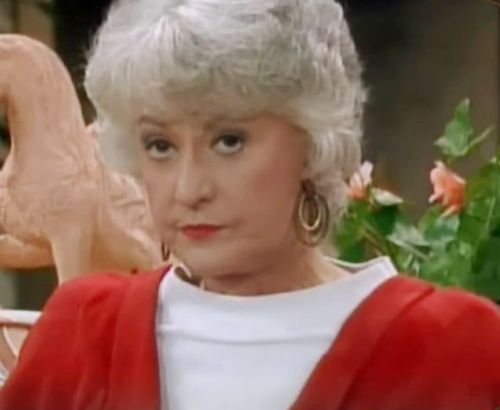In the last article, I described how a simple skit had evolved into a pitch for a sitcom. The setup was simplicity itself: four women all over the age of fifty sharing a house in Miami.
The Dynamic
I think that simplicity is part of the reason the show works so well. It’s about four women sharing a house. That’s it. The setup is even simpler than a classic family-based sitcom because – aside from in the Dorothy-Sophia relationship – the characters don’t even have assigned family roles and therefore lack the baggage such roles can bring. We almost never saw them at work, so could assume nothing from their occupation; they all dressed sensibly (or as sensibly as was possible in the 1980s), so their costumes gave little away. It really was just the four ladies1.
This simplicity gave the writers huge flexibility in choosing where to take things, but it also gave them a big challenge – which brings me to the show’s other great strength. In a sitcom, the characters must be particularly full of life because there’s so little time to get to know them. Since newcomers to The Golden Girls couldn’t take anything for granted, its characters had to be positively bursting. That classic rule of storytelling, character is action, tells us the most efficient way of getting to know a character is by observing what they do when faced with a challenge. Thankfully our four gals have character in spades. You only need to spend a few minutes in their company to know them. Dorothy will be the most assertive and tend to take charge; Blanche will find a way to make the situation all about her; Rose will be more timid, express confusion or recount an unwittingly hilarious shaggy dog story; Sophia will remain aloof and inject cynicism into the proceedings.
But in a sitcom there’s another important aspect about getting character across: the interplay. When conceiving a sitcom, a useful activity is to take each main character and describe their relationships, perhaps using a table describing every person’s attitude towards each of the others. As well as a source of drama, each relationship becomes a source of humour too.
| Dorothy | Blanche | Rose | Sophia | |
| Dorothy | – | |||
| Blanche | – | |||
| Rose | – | |||
| Sophia | – |
I’ll leave filling in the table as an exercise to the reader, but anyone familiar with The Golden Girls will guess already how simple that task will be. For example, think of conservative Sophia and her contempt for Blanche’s promiscuity.
BLANCHE: I treat my body like a temple.
SOPHIA: Yeah, open to everybody, day or night.
Or think of Dorothy’s attitude to Rose’s stupidity. How often has the camera lingered on Bea Arthur’s wordless, stony-faced reaction to her housemate’s utterances, waiting for the audience to stop laughing. Her character and performance are so strong that we know exactly what’s going through her mind.
ROSE: Like we used to say in St. Olaf: Christmas without fruitcake is like St. Sigmund’s Day without the headless boy.

Naughty Grannies
Despite it being on the surface a ‘safe’ show about four older ladies, it was anything but. The writers took advantage of their 9 p.m. time slot. By the standards of American network television of the time, the humour was bawdy. The characters did things that women of their age were not normally seen doing, not the least of which was enjoying active love lives.
In fact, some plot lines addressed topics rarely dealt with by TV characters of any age during the 1980s: homosexuality and same-sex marriage, HIV and AIDS, assisted suicide, drug abuse, impotency, menopause, mixed-race marriage, teenage pregnancy and so on. Execs, who’d initially feared that youngsters would be uninterested in prim old dears, instead began worrying the show was getting all rather saucy. Memos regularly came down expressing disapproval of ribald gags and risky plot lines.
The show makers could defend themselves by pointing to the ratings. Something was clearly working. People of all ages were lapping it up and the show immediately marched into the top ten.
For kids, it was like watching a bunch of naughty grannies. A whole generation recognised their own grandmothers on that screen.
– Terry Hughes, Director
But, as simple as the on-screen magic appeared to work, complications continued to threaten behind the scenes.
From day one, Bea Arthur’s appearance was a regular target for the writers. Her tall, lanky body and deep voice were the stuff of legend, but were also something of a sore point for Arthur.
Jealousy is an ugly thing, Dorothy. And so are you in anything backless.
After a couple of seasons of this treatment, she threatened to leave if these kinds of gags were not drastically toned down. Compared to other problems, this turned out to be a relatively simple one to deal with. The show runners could rein in the writers’ more cruel impulses, but there was little they could do to help Estelle Getty.
Early on, Getty began developing stage fright. Every week, as recording night neared, a slow sense of panic took hold and left her a nervous wreck. It also caused her to forget her lines. Getty tried all sorts of solutions: therapy, hypnosis, having her lines written onto cue cards and props. The problem was never fully solved, and it may have been the first signs of the dementia that eventually took Getty’s life, but somehow they got through it week after week.
Another challenge was the real-life relationship between Bea Arthur and Betty White, which was reportedly tense. Of course, some colleagues simply never gel, but Arthur seemed particularly impatient with White’s perky demeanour and her tendency to joke with the studio audience between filming breaks. Years later, one producer even recalled Arthur calling White the kind of four-letter name that I could only quote here if this weren’t a pre-watershed blog. But these ladies were professionals. Like Getty’s stage fright, they managed the problem and the audience never picked up on any complications.
Winning Gold
I wasn’t joking when I said The Golden Girls was a hit. In addition to winning a large audience share, it was regularly up for Emmy Awards and Golden Globes over its seven-year run, bagging 15 out of 68 nominations.
But beyond that, it did something else extraordinary. It took members of a neglected demographic, put them centre stage, and let them run riot, dispelling a lot of preconceived notions in the process. And it did so without resorting to any kind of gimmicks or tricks. It just let the characters be themselves in the simplest of ways.
I knew that I was doing something revolutionary in its quality, but I had no idea of the effect that it was going to have.
– Rue McClanahan
It was so anti-establishment that everybody loved it.
– Bea Arthur
It was the peak of everybody’s career.
– Betty White
- You might not even be aware that there was originally a fifth cast member: Coco, the gay houseboy -no, I’m not making that up – who was quickly considered extraneous and went the way of Richie Cunningham’s brother after just one episode. ↩︎


Leave a Reply